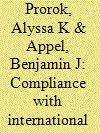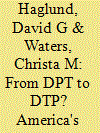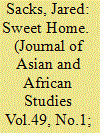| Srl | Item |
| 1 |
ID:
132325


|
|
|
|
|
| Publication |
2014.
|
| Summary/Abstract |
This article examines compliance with international laws prohibiting the intentional targeting of noncombatants in interstate war, specifically focusing on the role of third-party states in enforcement. We argue that the expectation of third-party coercion, when sufficiently high, can induce war participants to comply with this body of law. We identify the conditions under which combatant states will anticipate a high likelihood of coercion, demonstrating that third-party states are most likely to coerce combatants when they have both the willingness and opportunity to do so. Democratic third parties that value the rule of law and human rights possess the willingness to coerce war participants, while strong allies, trade partners, and intergovernmental organization (IGO) partners with existing ties to the combatant state have the opportunity to engage in coercion by linking combat-ant behavior to the provision of benefits or imposition of costs. Based on this logic, we hypothesize that war combatants who have ratified the Geneva/Hague Conventions prohibiting the intentional targeting of noncombatants during war are more likely to comply with the legal obligations included in those conventions when they interact with relatively strong democratic alliance, trade, and IGO partners. In a series of quantitative tests on a data set of all interstate wars from 1900 to 2003, we find strong statistical and substantive support for the role of third parties in inducing compliance with the law.
|
|
|
|
|
|
|
|
|
|
|
|
|
|
|
|
| 2 |
ID:
074410


|
|
|
|
|
| Publication |
2005.
|
| Summary/Abstract |
This article asks whether the differing manner in which liberal-democratic allies perceive security threats might prove corrosive to their alliance. In effect, the authors seek to test the assumption that 'democratic alliances' and liberal-democratic security communities are virtually indestructible so long as the members remain liberal democracies. The case chosen for diachronic analysis is the collapse of Anglo-American-French comity in the immediate aftermath of the liberal-democratic allies' victory in the First World War. Argued here is that differential threat perception (or DTP) contributed significantly to the ending of meaningful security cooperation among the group. In this sense, DTP seems to have weakened the conceptual underpinning of the democratic alliance implied by democratic peace theory (or DPT).
|
|
|
|
|
|
|
|
|
|
|
|
|
|
|
|
| 3 |
ID:
093949


|
|
|
|
|
| Publication |
2010.
|
| Summary/Abstract |
This article takes stock of the achievements and the shortcomings of post-apartheid South Africa, notably under the stewardship of Presidents Nelson Mandela and Thabo Mbeki. It analyses the implications of the General Elections held in April 2009 and offers some insights into the likely direction that a government headed by President Jacob Zuma will take over the coming months. The author argues, among other things, that the next five years will be crucial to the consolidation and promotion of constitutional democracy in South Africa, which in turn will determine the political future of the rest of sub-Saharan Africa.
|
|
|
|
|
|
|
|
|
|
|
|
|
|
|
|
| 4 |
ID:
129097


|
|
|
|
|
| Publication |
2014.
|
| Summary/Abstract |
For much of the winter of 2012, communities in shack settlements across Cape Town took to the streets in some of the most active civil disobedience protests since 1994. Knowing that the mainstream political terrain often seeks to obfuscate and mislead the public about the true nature of these protests, this paper investigates claims by politicians from the Democratic Alliance (DA) that these protests were being coordinated by the Youth League of the African National Congress (ANCYL). These big political players moralize the debate, shifting the focus from the perfectly legitimate issues of service delivery and demands for meaningful engagement. Speaking directly to community members of Sweet Home Farm, an informal settlement of 15,000 people in the Philippi area, revealed a yawning chasm between what official players are saying about Sweet Home and the actual realities on the ground.
|
|
|
|
|
|
|
|
|
|
|
|
|
|
|
|